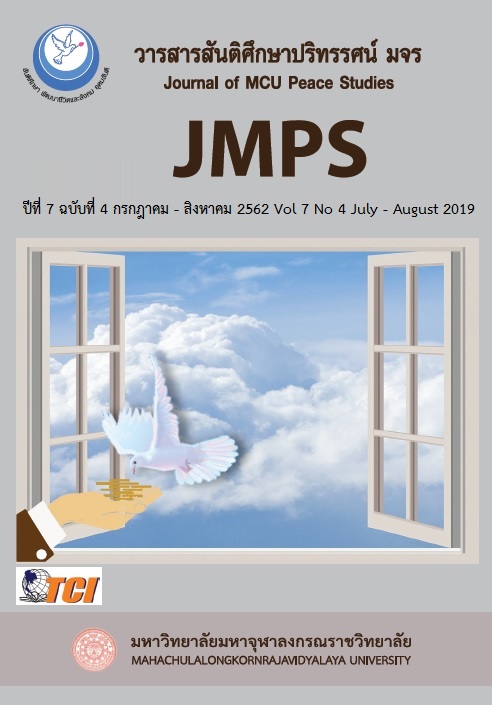การพัฒนาทรัพยากรมนุษย์เพื่อสร้างการปรับเปลี่ยน พฤติกรรมเพื่อสิ่งแวดล้อมของพนักงานโรงแรมสีเขียว ในประเทศไทย
Main Article Content
บทคัดย่อ
บทความวิจัยนี้มีวัตถุประสงค์ 1) เพื่อศึกษาบริบททั่วไปในการพัฒนาทรัพยากรมนุษย์ของโรงแรม สีเขียวในประเทศไทย 2) เพื่อศึกษาระดับพฤติกรรมเพื่อสิ่งแวดล้อมของพนักงานโรงแรมสีเขียว เป็นการวิจัย แบบผสานวิธี ได้แก่การวิจัยเชิงคุณภาพ และการวิจัยเชิงปริมาณ โดยใช้วิธีการสัมภาษณ์แบบเจาะลึก ผู้จัดการฝ่ายทรัพยากรมนุษย์ จำนวน 17 คน และแบบสอบถาม ในการสำรวจพฤติกรรมเพื่อสิ่งแวดล้อม ของพนักงานโรงแรมสีเขียว จำนวน 619 คน ผลการวิจัยพบว่า 1. บริบททั่วไปในการพัฒนาทรัพยากรมนุษย์ของโรงแรมสีเขียวในประเทศไทย ที่ฝ่ายทรัพยากร มนุษย์นำมาปรับเปลี่ยนพฤติกรรมของพนักงานในโรงแรมสีเขียว คือ 1) การให้ความรู้เพื่อสิ่งแวดล้อม 2) การจัดกิจกรรมเพื่อสิ่งแวดล้อม 3) ประชาสัมพันธ์เพื่อสิ่งแวดล้อม 4) การจัดหาวัสดุอุปกรณ์เพื่อ สิ่งแวดล้อม 2. ระดับพฤติกรรมเพื่อสิ่งแวดล้อมของพนักงานโรงแรม พบว่า พนักงานมีพฤติกรรมเพื่อ สิ่งแวดล้อมด้านการปฏิเสธสิ่งที่เป็นมลพิษต่อสิ่งแวดล้อมน้อยที่สุด (ค่าเฉลี่ย 3.766) ดังนั้น ข้อเสนอแนะ คือ แผนกทรัพยากรมนุษย์ของโรงแรมควรมีแนวทางในการพัฒนาทรัพยากรมนุษย์ของโรงแรมสีเขียวในเรื่อง การปฏิเสธสิ่งที่เป็นมลพิษต่อสิ่งแวดล้อม เช่น พลาสติก การเลือกใช้พลังงานทดแทน โดยผ่านการให้ความรู้ เพื่อสิ่งแวดล้อม การจัดกิจกรรมเพื่อสิ่งแวดล้อม การประชาสัมพันธ์เพื่อสิ่งแวดล้อม และการจัดหาวัสดุ อุปกรณ์เพื่อสิ่งแวดล้อม ให้แก่พนักงานในโรงแรม เพื่อส่งเสริมและสนับสนุนให้เกิดพฤติกรรมเพื่อ สิ่งแวดล้อมที่ดี
Article Details
ทัศนะและความคิดเห็นที่ปรากฏในบทความในวารสาร ถือเป็นความรับผิดชอบของผู้เขียนบทความนั้น และไม่ถือเป็นทัศนะและความรับผิดชอบของกองบรรณาธิการ ยินยอมว่าบทความเป็นลิขสิทธิ์ของวารสาร
เอกสารอ้างอิง
American Hotel & Lodging Association. (2011). Best practices. Retrieved April 4, from http://www.ahla.com/green.aspx?id=3616.
Atay, L., Dilek, E., & Yildirim, M. (2013). Green Hotel Management and Green Star Practice: A Case Study of Best Western President Istanbul Hotel. Journal of Travel and Hospitality Management. 10(1), 71-85.
Chan, E., & Hawkins, R. (2010). Attitude toward EMSs in an international hotel: An exploratory case study. International Journal of Hospitality Management, 29, 641–651.
Choosri, C. (2016). A Zero Waste Management Model for Small Hotels: A Case Study in the Koh Samui, Koh Phangan Surat Thani. Journal of International and Thai Tourism, 12 (1), 91-118.
Department of Environmental Quality Promotion. (2018). Green Hotel. Retrieved April 6, 2019, from http://www.deqp.go.th/service-portal/g-green/greenhotel/.
Department of Tourism. (2018). Asean Green Hotel. Retrieved April 3, 2019, from http:// www.tourism.go.th/view/1/มาตรฐาน_อาเซียน/TH-TH/1026/.
Economic Business and Grassroots Economic Research Centre. (2018). Hotel Business situation 2018. Retrieved April 3, 2019, from https://www.gsb.or.th/getattachment/dae8495d-7374-4fcc-9648 cdc9a5dde278/IN_hotel_61_detail.aspx.
Enz, C., & Siguaw, J. (1999). Best hotel environmental practices. Cornell Hotel and Motel Administration Quarterly, 72 (October), 77.
Faksung, D. (2014). Sufficient Economy Philosophy and the Management of Household’s Gabage in Dusit Community, Bangkok (Research report). Bangkok: Suan Sunandha Rajaphat University.
Green Leaf Foundation. (2017). Green Leaf Hotel. Retrieved March 28, 2019, from http://www.greenleafthai.org/th/green_found/.
Hsio, T., Chuang, C., Kuo, N., & Yu, S. (2014). Establishing attributes of an environmental management system for green hotel evaluation. International Journal of Hospitality Management. 36(2014) 197-208.
Kongrerk, T. (2017). The Model of Corporate social responsibility, organizational commitment and employee green behavior. UTCC International Journal of Business and Economics, 9(2), 17-38.
Mensha, I. (2014). Different Shades of Green: Environmental Management in Hotels in Accra. International Journal of Tourism Research. 16 (2014), 450 -461.
Mongkolruedee, P. (2010). Environmental management and performance of business: Case Study of hotels in Thailand. Thesis Master, Thammasat Business School, Thammasat University.
Nilawanjanakul, K. (2013). Knowledge and Attitude Influencing Purchasing Behavior of Green Products of Consumer in the Northeastern Region. Journal of Management Science. 2 (3), 65-83.
Noonin, S & Pasunon, P. (2014). Factors Affecting Behavior in Support of Being an Environmentally Friendly Hotel: A Case Study of Dusit Princess Srinakarin Hotel. Dusit Thani College Journal, 8 (1), 11-33.
Radwan, H., Jones, E., & Minoli, D. (2010). Managing solid waste in small hotels. Journal of Sustainable Tourism, 18 (2), 175–190.
Thailand Environment Institute. (2014). Green Business. Retrieved April 1, 2019, from file:///C:/Users/WIN10/Downloads/2012-TBCSD-Greenbusiness-y6-2_14(1).pdf.
Thaman, R. Morrison, R. J., Morrell, W. J., & Thaman, B. (2003). Wasted islands? Waste and the need for integrated waste management in the pacific island-Current status and prospects for reduction and safe disposal. Proceeding of Barbados Plan Action.
Tzschentke, N., Kirk, D., & Luynch, A. (2008). Going green: Decisional factors in small hospitality operators. International Journal of Hospitality Management, 27, 126–133.
Wachirawongsakorna, P. & Timsungnern, U. (2015). Assessment of Environmentally – Friendly Services of Hotels in The Lower North Eastern part of Thailand. Journal of Environmental Management. 11(1), 100-112.
Wandow, W. (2009). Environmental Management of Hotels in Krabi. Thesis Master, National Institute of Development Administration.


